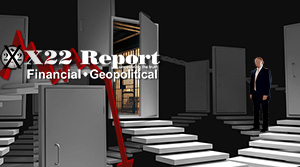Confirmed, The Plan Is Working, The Door Has Been Open, Art Of War – Ep. 3137
Podcast: Download (Duration: 1:39:59 — 43.0MB)
Watch The X22 Report On Video

Corporation in Germany are going bankrupt, it is a complete disaster. Watch Germany and California. The EV push is falling apart, the people are starting to learn they have been duped. The people can now see the agenda of the [CB]/[WEF], the crisis will finish them and destroy them. Trump and the patriots are in complete control, the [DS] is showing the people how corrupt they are, this is not by accident, this is being done on purpose, he is making them feel pain every step of they way. Trump is showing the people what election interference looks like, and the people are getting it. The plan is working and the polls show it.
Economy
Man forced to ditch $115K Ford EV truck during family road trip to Chicago: ‘biggest scam of modern times’ https://t.co/eNVB1aeEqv
— Ryan Saavedra (@RealSaavedra) August 11, 2023
It's not a coincidence that the things the Left wants to ban the most happen to be the things that give individuals the greatest physical freedom, independence, and choice — cars and airplanes. https://t.co/tlMYjO8TKa
— Noah Pollak (@NoahPollak) August 11, 2023
JUST IN – US producer inflation increased more than expected in July.
— Disclose.tv (@disclosetv) August 11, 2023
Paying at McDonald's with #Bitcoin in Lugano, Switzerland 🇨🇭 pic.twitter.com/JVRE9dtHs5
— Bitcoin Magazine (@BitcoinMagazine) August 11, 2023
- Global shipping company Maersk is warning that shipping volume is low because warehouse inventories are high. The goods are unsold.
- (Reuters) – […] CEO Vincent Clerc said he saw no sign that the destocking which has curbed global trade activity would end this year.
- USPS DATA – First-Class Mail revenue increased $221 million, or 4.0 percent, on a volume decline of 678 million pieces, or 5.9 percent, compared to the same quarter last year. Shipping and Packages revenue remained relatively flat while volume declined 41 million pieces, or 2.4 percent, compared to the same quarter last year.
- Marketing Mail revenue decreased $333 million, or 8.8 percent, on a volume decline of 2.6 billion pieces, or 16.0 percent, compared to the same quarter last year. The Marketing Mail decreases were driven by the continued decline in advertising spending due to economic pressures experienced throughout most of the fiscal year, a higher inflationary environment affecting print media production costs. (link)
- So, let’s put it all together….
- Consumers did not buy stuff. As a result, spring inventories were high. Purchasing managers forecast weak sales. Summer purchase orders were very low. Shipping companies reflect declines in shipping because the purchase orders were low. Advertising and marketing budgets were cut to meet the decrease in consumer spending. Consumers are not forecast to spend this holiday season.
- Keep in mind, this is all intentional. This is all part of the outcome from “managing the transition” to a new energy economy.
- As you are well aware the various western nation central banks including the U.S. Federal Reserve, are raising interest rates into a global economic contraction, a drop in demand. Raising interest rates into a contracting economy is counterintuitive, it runs against the expressed interest of government to grow economic conditions. However, there is a purposeful design to the contradiction. [A TLDR Version Here]
- Economic contraction is the lowering of economic activity. Raise interest rates -in a general sense- and businesses invest less, borrowers borrow less, consumers purchase less, employers expand less, and the economy overall slows down. When the economy turns negative, meaning less products and services are produced, we enter a recession. Some businesses and employers do not survive a recession and subsequently unemployment rises.
- During recessionary periods people buy less stuff, people have less income stability, and economic activity drops. Recessions are bad for middle-class and working-class people.
Source: theconservativetreehouse.com
Political/Rights
RIP: Budweiser!
This is the way: bankrupt the groomers & pedophiles & other assorted Democrats. https://t.co/5mACfX5oj0
— Emerald Robinson ✝️ (@EmeraldRobinson) August 11, 2023
🚨BREAKING: FTX's Sam Bankman-Fried TO BE JAILED | Bail Revoked
SBF is being incarcerated for tampering with at least 2 witnesses.
He will be in jail prior to his October trial, facing a range of fraud and conspiracy charges.
He may have access to a laptop with an internet… pic.twitter.com/1sj8fMm8cO
— Mario Nawfal (@MarioNawfal) August 11, 2023
"Which ONE of the following news organizations do you TRUST THE MOST?"
Legacy Broadcast Networks now can't break 10% in most trusted
ABC News: 7%
CBS News: 6%
NBC News: 7%Broadcast Network News Less Trusted – https://t.co/LT8INeM72Y https://t.co/WgcdSLBHNr
— Rasmussen Reports (@Rasmussen_Poll) August 10, 2023
CNN just found out the party of Reagan is now firmly the party of Trump
Voters tell a defeated looking John King:
– The election was stolen
– The prosecution of Trump is a sham
– The US shouldn’t support UkraineYou love to see it 🇺🇸 pic.twitter.com/2CobGsHvsQ
— johnny maga (@_johnnymaga) August 10, 2023
TAKE A LISTEN
BREAKING: Merrick Garland appoints U.S. Attorney David Weiss as a special counsel in the Hunter Biden criminal investigation. pic.twitter.com/soM7t1tOfT
— Charlie Kirk (@charliekirk11) August 11, 2023
How can AG Merrick Garland tab USA David Weiss be a special counsel, while Weiss retains his position as USA?
The law says: "The Special Counsel shall be selected from outside the United States Government." pic.twitter.com/e2j90hZfDR
— Benjamin Weingarten (@bhweingarten) August 11, 2023
PERJURY: Garland testified to Congress that USA Weiss had complete authority to investigate and prosecute Hunter Biden. If that was true why bother appointing him special counsel? The answer is that he doesn’t want Weiss to testify about his attempt to immunize Hunter.…
— @amuse (@amuse) August 11, 2023
Federal prosecutors move to dismiss Hunter Biden tax charges – so they can be filed in another venue
Hunter Biden plea deal has fallen apart – for now
This coincides with Weiss being named Special Counsel. The "investigation" continues… pic.twitter.com/J1EDYQEJ5S
— Techno Fog (@Techno_Fog) August 11, 2023
🚨STATEMENT🚨
This move by AG Garland is part of the Justice Department’s efforts to attempt a Biden family coverup in light of @GOPoversight's mounting evidence of President Biden’s role in his family’s schemes selling ‘the brand’ for millions of dollars to foreign nationals. pic.twitter.com/ZXMB1ngFX1
— Rep. James Comer (@RepJamesComer) August 11, 2023
Merrick Garland took himself out of the loop, pressure is off, Weiss is now independent and the investigation can be stalled. All Weiss needs to say or not say is that we are still investigating, what will this do, will it stop congress from getting documents, will congress lose subpoena power, it allows [DS] to coverup the evidence
This action by Biden’s DOJ cannot be used to obstruct congressional investigations or whitewash the Biden family corruption.
If Weiss negotiated the sweetheart deal that couldn’t get approved, how can he be trusted as a Special Counsel?
House Republicans will continue to pursue…
— Kevin McCarthy (@SpeakerMcCarthy) August 11, 2023
the facts for the American people.
House Oversight Committee Chair James Comer, R-Ky., told Newsmax on Thursday that the bank records his committee released this week "confirms that the president of the United States has been lying to the American people." https://t.co/59ZhD22vVX
— NEWSMAX (@NEWSMAX) August 10, 2023
Good Morning !
RASMUSSEN: 60% of 'Likely Voters' Believe President Biden's Part of an Illegal Cover-Up | texasinsider – https://t.co/zR6Zj3SlgD
— Rasmussen Reports (@Rasmussen_Poll) August 11, 2023
John Solomon says the claim that Joe Biden was just following US policy in 2016 when he threatened to withhold the billion dollars from Ukraine is about to fall apart:
“Stay tuned. We’ve got some new documents we’ve obtained through litigation and through sources…” 👀 pic.twitter.com/cMfCsEv4XH
— Patri0tsareinContr0l (@Patri0tContr0l) August 11, 2023
Lady Gaga’s Dad Furious as Unruly Illegals Take Over His Neighborhood: ‘Just Enabling ‘Em’
- Liberal pop star Lady Gaga’s father is thoroughly disgusted by the City of New York’s response to the growing illegal immigrant crisis, especially since it is his part of the city that is suffering under the policies as migrants flood his once-quiet neighborhood.
- Joe Germanotta is a restaurant owner since 2012 in the Big Apple’s Upper West Side, and the “Born This Way” singer’s father. But now, he is also a community leader attempting to get city hall to do something about the dangerous conditions that have cropped up in his neighborhood after the city decided to house hundreds of illegal aliens inside a former residence hall for music, art and drama students.
- His community was once a safe, quiet and upscale area where businesses and families thrived. But now that the city has moved hundreds of illegals into the Stratford Arms Hotel, that has changed, the New York Post reported.
- Germanotta said that now the neighborhood is more dangerous as young illegals carouse through the night, drinking, doing drugs and dangerously riding unregistered motor scooters and e-bikes through the streets at all hours.
source: thegatewaypundit.com
NBC’s Chuck Todd Forced to Admit GOP Governor Was Right: ‘And Sure Enough, Here We Are’
- NBC’s “Meet The Press Now,” Todd teased a segment about the “growing humanitarian crisis” in New York City and the shelter system, which is being “slammed by an influx of migrants and new calls for federal help. I guess Greg Abbott was right when he said, once he got blue cities to deal with this, that they would be very upset at the federal government,” Todd said, just before they cut to commercial.
WATCH: NBC’s Chuck Todd on the border crisis:
“I guess Greg Abbott was right when he said, ‘Once he got blue cities to deal with this, that they would be very upset at the federal government.’”#BidenBorderCrisis pic.twitter.com/B0ANspWtvj
— Steve Guest (@SteveGuest) August 10, 2023
Massachusetts has become the latest state to declare a state of emergency due to the influx of migrants, with more than 20,000 individual migrants — not including families — currently in state shelters, including children and pregnant women, according to Todd.
“Last week in New York City, scores of migrants were seen sleeping outside the Roosevelt Hotel, which has been serving as a migrant arrival center,” Todd said.
New York enjoying their sanctuary city status.
93,000 immigrants have arrived in NYC since the spring.
Roosevelt hotel, monday morning. pic.twitter.com/9xLJj4uQcW
— Raymond (@Raymond82310289) August 1, 2023
WATCH🚨: New York Congressmen Jamaal Bowman (D) saids the migrant crisis in New York will cost Democrat seats in 2024. He states:
“Democrats are looking bad right now.” pic.twitter.com/dAerdYbiBo
— Officer Lew (@officer_Lew) August 10, 2023
- “There’s a lot of background to this story,” Todd said to NBC correspondent Ron Allen, “The governor of Texas had been complaining about the administration not helping for months, and he said, ‘Well, I’m going to start sending these migrants to blue states, maybe they’ll get some action.’”
- “He’s turned out to be right about this — that he knew that other governors — it didn’t matter Democrat or Republican — would also feel burdened by this. And sure enough, here we are,” Todd said.
Source: thegatewaypundit.com
Geopolitical/Police State
BREAKING: CIA agent Aaron Berman (the head of censorship at Facebook/Meta) has deleted his LinkedIn account.
Why now? Probably because Meta has turned over documents to Jim Jordan's committee that show Berman's role in Meta's censorship operation.
— Emerald Robinson ✝️ (@EmeraldRobinson) August 10, 2023
US Is Sending FBI to Ecuador to Help Probe Presidential Candidate’s Killing
- Assistance offered after slaying of candidate Villavicencio
- Ecuador under Lasso among closest US allies in Latin America
-
The Biden administration is planning to send the Federal Bureau of Investigation to Ecuador to aid in the investigation into the assassination of presidential candidate Fernando Villavicencio, according to people familiar with the plans.
The US offered the assistance on Wednesday night after the shooting of Villavicencio in Quito, according to one of the people. Both asked not to be identified without
Source: bloomberg.com
The @FBI is sending agents to Ecuador to cover up the assassination of a conservative candidate.
- The Biden Regime on Thursday announced a US, Iran prisoner swap in exchange for $6 billion in Iranian assets held in South Korea.
- Is this the Biden Regime’s new, unwritten Iran nuke deal?
-
Today the Biden admin announced a US/Iran prisoner swap in exchange for $6 billion in Iranian assets held in South Korea.
-
As I wrote in my recent @theamgreatness op-ed, this is part of a secret, unwritten Biden admin nuke deal with Iran that will also allow Iran to enrich… https://t.co/Fu5w862UR1
— Fred Fleitz (@FredFleitz) August 10, 2023
- Under the proposed agreement, Iran will only be allowed to buy food and other humanitarian needs with the funds.
- Who actually believes this?
- NBC News reported:
-
The U.S. government has identified three American citizens held in Iran — Siamak Namazi, Emad Shargi and Morad Tahbaz. There are two additional Americans being held in Iran, but their families have chosen not to identify them publicly, the White House National Security Council said.
- Biden’s prisoner swap has Obama’s name all over it.
- In January of 2016, Barack Obama sent $400 million in Euros and Swiss Francs to Iran on unmarked cargo planes — the very same day, Tehran agreed to release 4 Americans who were being held.

Source: thegatewaypundit.com
- An American graduate student detained in Iran for more than three years has been freed after the Trump administration agreed to a prisoner exchange with Tehran.
- The release of Xiyue Wang and Masoud Soleimani, an Iranian held in the U.S. on charges of violating American sanctions on Iran, comes at a moment of exceptionally high tensions between Iran and the United States. It’s unlikely to lead to any thaw in the relationship, but it could offer some hope for other Americans imprisoned in Iran.
Source: politico.com
War
WW III Watch: Niger Junta Tells Nuland They Will Kill Deposed President Bazoum if Attacked
- Niger’s junta told Biden Color Revolution insurrection expert Victoria Nuland that they would kill deposed President Mohamed Bazoum if neighboring countries attempted any military intervention to restore his rule, two anonymous Western officials allegedly told The Associated Press.
- .
Source: thegatewaypundit.com
- Hawaii is burning. Almost an entire beach-front city has been utterly destroyed. People were driving into the ocean to avoid the flames and are now trying to collect anything they can find to remind them of their past. At least 53 are dead.
- The border is wide open. Fentanyl is pouring across the border. Armed military aged men have been caught on game cameras and drone footage crossing rivers into the US. Fentanyl deaths have reached record highs under Joe Biden.
- And to top it off, we are facing another “government shutdown.” This seems to be a quarterly thing now.
- This is a perfect time for Biden to inject his own personal agenda into a budget and pressure House Republicans because he’s asking for a little carve out for the above mentioned situations.
- The administration is asking for $40 billion in new “emergency spending”, including $24 billion to Ukraine. But he hasn’t totally forgotten about us Americans: there is $12 billion to replenish the federal disaster relief fund and $4 billion to address issues at the border. A wall would have cost around $5 billion, however, this $4 billion would be for “shelter and services for migrants and counter-fentanyl efforts.”
Hopefully this time the House Republicans don’t cave.
From Politico:
Source: thegatewaypundit.com
Russian Defense Minister: NATO assembled 360,000 troops in Eastern Europe. Poland is preparing to occupy Western Ukraine.
Important: If NATO moves from a proxy war setting into a direct war with Russia it will be WW3 with all the devastating consequences. pic.twitter.com/iO8N1AzREv
— Kim Dotcom (@KimDotcom) August 10, 2023
This is all you need to worry about right now. Nothing else matters. 98% of humanity will vanish if this US proxy war escalates to WW3. Everyone and everything you love will be gone. A nuclear war between the two major nuclear powers means the end of the world. We are very close.
— Kim Dotcom (@KimDotcom) August 10, 2023
False Flags
Doctors Can Prescribe Ivermectin for COVID-19: FDA Lawyer
- “FDA explicitly recognizes that doctors do have the authority to prescribe ivermectin to treat COVID,” Ashley Cheung Honold, a Department of Justice lawyer representing the FDA, said during oral arguments on Aug. 8 in the U.S. Court of Appeals for the 5th Circuit.
- The government is defending the FDA’s repeated exhortations to people to not take ivermectin for COVID-19, including a post that said “Stop it.”
- The case was brought by three doctors who allege the FDA unlawfully interfered with their practice of medicine with the statements. A federal judge dismissed the case in 2022, prompting an appeal.
- “The fundamental issue in this case is straightforward. After the FDA approves the human drug for sale, does it then have the authority to interfere with how that drug is used within the doctor-patient relationship? The answer is no,” Jared Kelson, representing the doctors, told the appeals court.
- The FDA on Aug. 21, 2021, wrote on X, formerly known as Twitter: “You are not a horse. You are not a cow. Seriously, y’all. Stop it.” The post, which linked to an FDA page that says people shouldn’t use ivermectin to prevent or treat COVID-19, went viral.
- In other statements, the FDA said that ivermectin “isn’t authorized or approved to treat COVID-19” and “Q: Should I take ivermectin to prevent or treat COVID-19? A: No.”


![Ep 3137a - The Controlled Agenda Of The [WEF][CB] Is Waking People Up, Crisis Will Finish Them](https://x22report.com/wp-content/uploads/2023/08/youtube_financial_recession-300x169.jpg)


